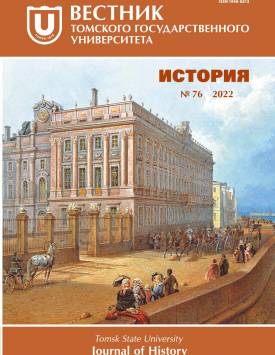«I owe everything to myself only»: Roxandra Sturdza - acquisition of identity in the era of transformations of the late 18th - early 19th centuries
The article studies the acquisition of identity by the young Roxandra Sturdza, offspring of the influential families of Moldavian and Wallachian lords. The study is based on the socio-symbolic approach that focuses on the level of sense and meanings conveyed by the individual in the story of own life. The events described are the stages of life experience through which the subject develops the dialectic of identity and difference, exclusion and inclusion, proximity and distance. The source base of the study is personal documents: memoirs written by Roxandra Edling (Sturdza), published in Russian and French, as well as correspondence with Joseph de Maistre. Having obtained a proper home education in a provincial estate, Roxandra started mastering the wisdom of social life in St. Petersburg when she was 15. The ultimate goal of determining the girl’s destiny was marriage, and contributing factors were wealth, attractiveness, or the highest patronage. The Sturdzas decided to secure the future of their daughter and procured her appointment as a maid of honor. Taking that as a chance, Roxandra concentrated her communication efforts on the influential princess Charlotte von Lieven and the house of naval commander Pavel Chichagov. The key moment for the maid of honor became the meeting with the ideologist of political conservatism Joseph de Maistre. Roxandra was a welcome companion for his “philosophical meals”: the femininity of her manners and appearance was combined with her male mind and will. The attention of the European philosopher and diplomat expanded her social contacts in the capital. Countess Varvara Golovina helped Roxandra Sturdza in her appointment as the maid of honor for the wife of Tsar Alexander I. Since 1809 Roxandra became the maid of honor for the Empress Elizabeth Alexeievna. As a result of the investigation, the author came to the conclusion that the study of the subjective parameters of female experience contributes to a rethinking of the historical process, both contradictory and ambiguous. Difficult external circumstances of M. Sturdza’s growing up - emigration to the Russian Empire, deterioration in the financial situation of the family, living in a provincial estate in the Mogilev Governorate surrounded by the northern nature - did not deter the living principles of the heiress of the Moldavian rulers. Implanted range of virtues, devotion to the Orthodox religion, cultural potential of the “woman of the world” and the solid “educational capital” were factors that allowed the young Roxandra to gain identity. These factors were subject to her ambitious plans, devoted to restoring of the former greatness of the Sturdza family. The circumstances of the Roxandra Sturdza’s destiny show how the historical events can change the life trajectory of a certain family, as well as how the “surprising ability of communication” of inconspicuous maid of honor contributed to her rise to the entourage of Alexander I.
Keywords
Roxandra Sturdza, Moldavian princess, family, secular society, maid of honorAuthors
| Name | Organization | |
| Drach Oksana A. | Boris Grinchenko Kyiv University | o.drach@kubg.edu.ua |
References

«I owe everything to myself only»: Roxandra Sturdza - acquisition of identity in the era of transformations of the late 18th - early 19th centuries | Tomsk State University Journal of History. 2022. № 76. DOI: 10.17223/19988613/76/1
